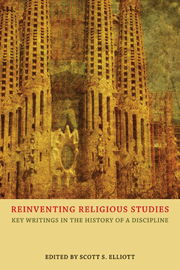Book contents
- Frontmatter
- Contents
- Introduction
- 1 For such a time as this: the Council of Societies for the Study of Religion, 1969–2009
- Part I Inventing and reinventing the field of religious studies
- Part II Method and theory in religious studies
- 9 Neutrality in the study of religion
- 10 Assessing social-scientific theories of religion
- 11 Playing hardball in religious studies
- 12 The academic study of religion: a methodological reflection
- 13 Fending off the social sciences
- Part III Teaching religion
- Part IV Women and the bible in religious studies
- Part V Religion and religious studies in civic life
- Part VI Religious studies and identity politics
- Part VII Islam and 9/11
- Bibliography
- Acknowledgments
- Index
11 - Playing hardball in religious studies
from Part II - Method and theory in religious studies
- Frontmatter
- Contents
- Introduction
- 1 For such a time as this: the Council of Societies for the Study of Religion, 1969–2009
- Part I Inventing and reinventing the field of religious studies
- Part II Method and theory in religious studies
- 9 Neutrality in the study of religion
- 10 Assessing social-scientific theories of religion
- 11 Playing hardball in religious studies
- 12 The academic study of religion: a methodological reflection
- 13 Fending off the social sciences
- Part III Teaching religion
- Part IV Women and the bible in religious studies
- Part V Religion and religious studies in civic life
- Part VI Religious studies and identity politics
- Part VII Islam and 9/11
- Bibliography
- Acknowledgments
- Index
Summary
Current attitudes in the study of religion are generally marked by a singular absence of criticism of the various religious traditions, either from the viewpoint of a particular religious tradition or from a secular point of view, notwithstanding R. C. Zaehner's attempts in the introduction and conclusion to The Concise Encyclopedia of Living Faiths (1977). This fact in itself is worth remarking as the humanities and social sciences, to which the study of religion presumably belong, are distinguished by vigorous controversy and debate in the other areas comprising it. For example, the relative merits of political and economic systems are freely discussed. In the extreme case of political economy it has even been said that where there are six economists there are seven opinions! In the study of religion such disputation typically centers on the methodologies employed in studying the traditions rather than the traditions themselves. The point needs to be understood carefully. It is not being implied that the study of an individual religion lacks sophistication or does not exercise the critical faculty. What is being maintained is that questions such as the following are not asked: Do people really re-incarnate? Is there really no soul? Is ethics enough? Does the Tao exist? Did Moses receive the Laws from God? Was Jesus the son of God? Did God speak to Muhammad? In other words, the study of religion does not play hardball anymore.
- Type
- Chapter
- Information
- Reinventing Religious StudiesKey Writings in the History of a Discipline, pp. 77 - 82Publisher: Acumen PublishingPrint publication year: 2013



